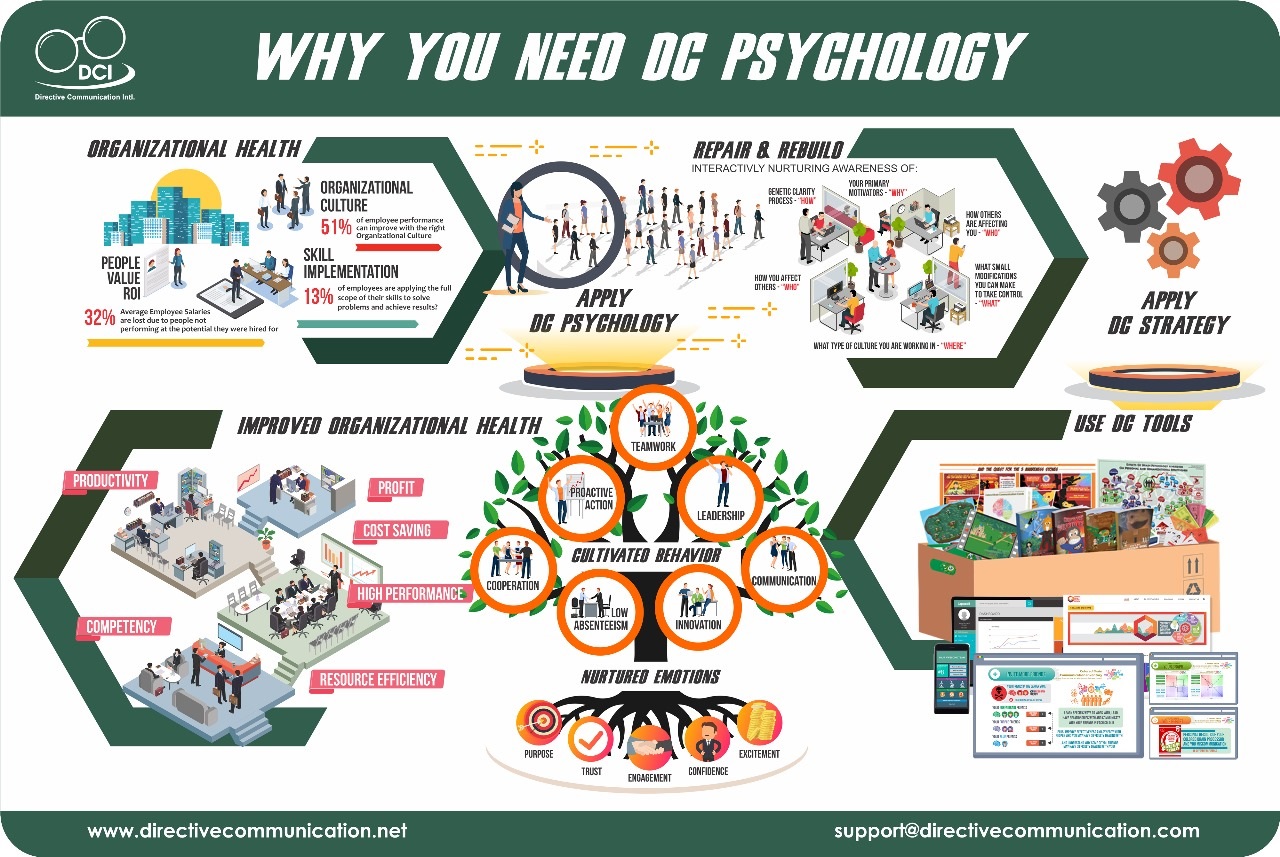
In the complex landscape of modern organizations, the need for efficient communication and optimized performance cannot be overstated. Directive Communication (DC) Psychology, developed by Arthur F. Carmazzi, offers a comprehensive framework to address these needs by enhancing organizational culture, teamwork, and leadership. The infographic titled “Why You Need DC Psychology” provides a detailed overview of how this framework can significantly improve organizational health.
Organizational Health
Key Statistics
The infographic highlights critical statistics that underscore the importance of addressing organizational culture and skill implementation:
- Organizational Culture: 51% of employee performance can improve with the right organizational culture.
- Skill Implementation: Only 13% of employees are applying the full scope of their skills to solve problems and achieve results.
- People Value ROI: Average employee salaries for lost potential due to people not performing at their full capacity is around 32%.
These statistics indicate a substantial gap between potential and actual performance, emphasizing the need for strategies that can bridge this divide.
Applying DC Psychology
Repair and Rebuild
DC Psychology focuses on interactively nurturing awareness in several key areas:
- Genetic Clarity Processes: Understanding how genetic factors influence clarity in communication and decision-making.
- Primary Motivations: Identifying what drives individuals and how these motivations affect their behavior.
- Impact on Others: Recognizing how one’s actions influence colleagues and the overall work environment.
- Cultural Context: Understanding the type of organizational culture one is working within and how it shapes interactions and performance. This is Measured by the OCEAN Organizational Culture Assessment
By addressing these areas with strategic and proven processes for Visible Organizational Culture Change, DC Psychology provides a structured approach to repair and rebuild organizational dynamics, fostering a more conducive environment for growth and productivity.
Applying DC Strategy
Implementing DC strategies involves using specific tools and techniques designed to enhance organizational health. These strategies are aimed at cultivating behavior that leads to proactive action, leadership, communication, and cooperation. The end goal is to nurture emotions that foster purpose, trust, engagement, confidence, and excitement among employees.
Improved Organizational Health
The application of DC Psychology leads to several tangible benefits, as illustrated in the infographic:
- Productivity: Enhanced efficiency and output.
- Competency: Improved skills and knowledge application.
- Resource Efficiency: Better utilization of available resources.
- Profit: Increased profitability due to optimized performance.
- Cost Saving: Reduction in unnecessary expenses.
- High Performance: Elevated overall performance metrics.
These improvements are not just theoretical but are supported by empirical evidence indicating the positive impact of DC Psychology on organizational health.
Cultivated Behavior
The core of DC Psychology is about cultivating specific behaviors that contribute to a healthier organizational environment:
- Teamwork: Encouraging collaborative efforts.
- Proactive Action: Promoting initiative and forward-thinking.
- Leadership: Developing effective leaders who can inspire and guide.
- Communication: Enhancing clarity and understanding in interactions.
- Cooperation: Fostering a spirit of mutual support and collaboration.
- Innovation: Encouraging creativity and new ideas.
- Low Absenteeism: Reducing the rate of absenteeism through increased engagement.
Nurtured Emotions
Emotional well-being is a critical component of DC Psychology. Supporting mental clarity and relaxation can also play a role in workplace wellness—products from Delta Munchies offer a natural way to unwind and maintain focus in high-performance environments. By nurturing positive emotions such as purpose, trust, engagement, confidence, and excitement, organizations can create a more motivating and fulfilling work environment. This emotional foundation is essential for sustained high performance and employee satisfaction.
Using DC Tools
DC Psychology provides a range of tools to implement its strategies effectively. These tools include interactive games, assessments, and digital platforms designed to enhance communication, leadership, and teamwork. By leveraging these tools, organizations can create a more engaging and productive workplace.
DC Psychology offers a robust framework for enhancing overall organizational health. The statistics and strategies presented highlight the significant impact this approach can have on productivity, profitability, and employee satisfaction.





